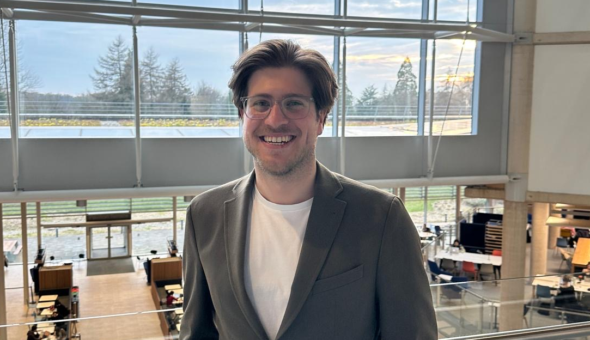If we want a gender balanced world, we need to understand the complex causes of inequality. Director of the Centre for Business, Organisations and Society Andrew Crane spoke to Lynn Prince Cooke, Professor of Social Policy at the University of Bath, about her research on inequality and intersectionality, and her reflections on gender balance in academia.
AC: Your work is about gender and labour markets, and the factors that lead to inequality. What are the big picture findings?
LPC: You can’t just look at one source of potential inequality to understand gender inequality. It’s constructed over the life course from a very young age, and from the very beginning we’re socialised into gender identities. But it’s not just over time, it’s also embedded into our relationships. We have our own identity in relation to gender, but those identities shift if you’re in a partnership as opposed to on your own. And then we’re also embedded in organisations and that has been really neglected in the research – what is the role of organisations in creating gender inequality.
AC: How does this shape your research?
LPC: Most people have heard of the gender wage gap, but the difference in women’s and men’s wages usually reported in the press is for the entire population of workers. To understand gender inequality, you need to understand the reasons for the gap. One source is that over the life course, men and women make different decisions about education, employment sectors, and work hours – these decisions are still gendered, but do explain about half of the population-wide gender wage gap. One of the exciting things about our current research is that we have administrative data for Finland. Administrative data give us data on employees, nested in employers and over time. These data allow us to see what organisational contexts support more equality, around issues like gender, parenthood, or other groups.
Specifically, we can look at the wages of men and women in the same job in the same firm, what we call the job-cell. If women and men are paid the same for doing the same work as required by law, there should be no job-cell gender wage gap. In one network I’m involved with, there are administrative data for firms across 13 countries. What the researchers have found is that there are significant gender job-cell gaps, although these are somewhat smaller than the population-wide gaps. The size of job-cell gaps varies across countries, but nowhere is it zero. The smallest gap is about 6%, but in some countries it is as high as 28% - that’s for women and men doing the same job in the same firm.
AC: So your research is looking at the nature of inequalities, and the causes of it.
LPC: Yes – the causes across the life course and as structured at multiple levels, much like a Russian doll: you’ve got individuals, in couples, in organisations, in society. I’m also interested in the class differences in these structures – it’s about intersectionality (limited to gender and class), and how this relates to family outcomes. For example, one economic theory claims that wives’ employment equality makes families less stable, increasing the risk of divorce. You could question the causal order here – there might be relationship problems which lead a woman to think she needs to get a job.
In any event, one thing I am researching is whether there are class differences in the impact of equity within the family, in both paid and unpaid work, on the risk of divorce. The working class tends to hold traditional gender attitudes where the man should be the breadwinner and the woman takes care of the home and children, even if the family cannot afford to live on a single income. In contrast, couples in high-skilled occupations usually espouse the rhetoric of equality, but often the demands of their jobs force even high-skilled women to scale back. We are in the midst of analysing whether these class differences in attitudes manifest in the relationship between gender equality in couples’ divisions of paid and unpaid work and divorce risk. If attitudes shape the risk, you would expect greater equality to be more hazardous in terms of divorce risk for low skilled people, and protective of the relationship for the high skilled.
AC: Are there battles in your field over the findings, and the implications of them?
LPC: Yes. One of the papers the team is working on now is about the so-called “welfare state paradox.” The Nordic countries have been lauded for their pro-equality, family-friendly policies, but there’s now research showing a more complex picture. These policies work to draw less-skilled women into paid work, but by the same token this prevalence of family friendly policies is creating a “glass door” for high-skilled women, barring them from lucrative private sector, high wage firms and jobs. Since the Nordic model has been held up as an exemplar in the policy world, to say it’s not all good has caused some debate.
We’re jumping into this debate using some new methods. We’re looking at the gendered effects of parenthood on the combined wage distribution in each of three countries. So we’re not just looking at mothers compared with childless women as usually done when estimating motherhood wage penalties - women make less money than men anyway so just comparing among women doesn’t say anything about gender inequality. Instead we’re examining the effect of fatherhood, motherhood and being child-free across quantiles of the combined wage distribution in each country. Doing it this way reveals both between and within gender dynamics. What we find is that, in fact, the motherhood penalty across the wage distribution is largest in Finland, supporting the welfare state paradox argument. This is controversial research. But results serve to make an important point: one of the reasons we still have gender inequality is because policies promoted as reducing gender inequality do not necessarily achieve this; they can just reshape it. We need to become more cognisant of that.
AC: You’re interested in inequalities in labour markets – how do you see the academic labour market?
LPC: I was dismayed last year when the BBC released data on the UK gender pay gap – in the private sector it was about 10% but in universities it was 18%. To me, universities should be at the forefront, morally, of equality. But instead they seem to be bastions of inequality on gender, race and so on. There are far fewer female than male professors, and the ones who achieve full professor often get paid less money.
My current mission is to agitate the higher education sector - there is no excuse for this, so I’m pushing for transparency. Academic pay at professor level is a black box in the UK. Morally, the issues have to get out there and there needs to be a push for change. Generally, I think HR Directors want this to happen but it’s going against a pretty old hierarchy.
We also need to look at the workload model – in this department we have a very transparent workload. It’s important, because it shouldn’t just be the women doing the intense, student facing work. These are real issues, and change is happening. But it’s an old system and will take a lot to improve it.
AC: What do you think about initiatives like Athena Swan?
LPC: One of the reasons they do these things is to promote equality, but when you analyse the outcomes you see they can actually have a backlash. It shows how robust hierarchies are – with a new initiative tackling some aspects of gender inequality, inequalities bubble up in a new way. For example, there’s some really interesting research that shows in organisations claiming to have meritocratic systems in place, gender/race/ethnic discrimination is greater when evaluating two people with identical backgrounds and identical performance. In other words, having initiatives like Athena Swan can make people complacent, assuming gender equality is sorted. But in fact, such programs can intensify the likelihood that unconscious bias runs riot.
AC: So what does the future hold for you and your research?
LPC: I’ll put my research out there and explain it, but for things to have a huge impact you need a perfect storm. Science is a community event. What matters to me is that I leave a good foundation for future research. The best judgement of my work will be if the young scholars I mentor or supervise have a big impact on future research or policy.
Header image by rawpixel.com
Respond



